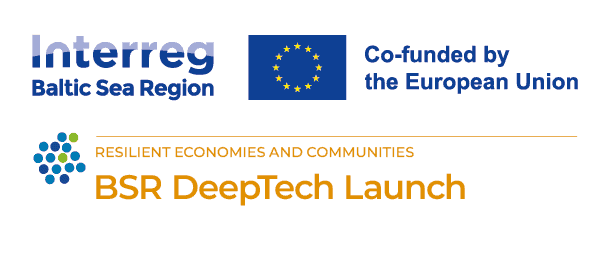
From Spark to Launchpad: the BSR DeepTech Launch Journey
08 September 2025
The spark: recognising a deep-tech gap
In the autumn of 2023, a group of institutions across the Baltic Sea Region recognised a common problem: talented students and young researchers with deep-tech ideas often lacked the business skills, support networks and transnational perspective needed to turn those ideas into sustainable ventures.
That’s when the BSR DeepTech Launch project kicked off: an initiative under the Interreg Baltic Sea Region 2021‑27 programme aimed at “developing an efficient model for fostering STEM entrepreneurship among students and young researchers, to increase deep-tech innovation in the economy.” With the lead partner being Mazovia Development Agency Plc. (Poland), and other partners from Germany and Lithuania, the project officially ran from August 2023 to July 2025.
Mapping the terrain: understanding needs & building networks
The first part of the journey was about listening. The team launched a Survey of pre-incubation needs among students and young researchers – asking: what do you lack? What would help you move from idea to enterprise?
At the same time, each partner built up a Regional Stakeholder Group (RSG): business-support organisations, higher-education & research institutions, sectoral agencies. These groups provided local insight and helped shape the project.
One early step: on 6 October 2023 the Polish partner organised the 1st RSG meeting virtually.
From the data gathered, the consortium produced:
- a gap and SWOT analysis of the entrepreneurial ecosystem for deep-tech students & young researchers.
- region-specific insights into what support was missing, and where cross-border cooperation could add value.
The result: a clearer picture of what needs to be built.
Co-creating the toolbox: designing workshops & scenarios
With the needs mapped, the next phase was about design and co-creation. The project teams developed Exploratory Workshop Scenarios (that is: hands-on, interactive sessions) to test modes of delivering business and entrepreneurial awareness to the target group.
In Poland, for example, the series of three workshops under the title “Turn passion into business” (17 Oct, 21 Oct, 29 Oct 2024) were held at the Warsaw University of Technology’s Innovation Centre.
- At the first workshop (17 Oct) participants worked on the fundamentals of transforming a scientific idea into a business concept.
- At the second (21 Oct), they progressed with group-work tasks deepening validation steps.
- At the third (29 Oct) the session “Make a business out of your passion” invited them to present their idea-sketches and peer-group validate them.
Similar workshop series were also organised in Germany and Lithuania, allowing the project partners to test the toolbox elements in diverse academic and cultural settings and compare results across regions.
Meanwhile, the consortium defined Key Performance Indicators (KPIs) and a 2nd feedback survey to monitor participant engagement, knowledge acquisition and idea-to-action transition.
From draft to final: toolbox development and transnational collaboration
Having tested scenarios via workshops and collected feedback via surveys and RSG input, the project moved into its core deliverable: the Toolbox for fostering DeepTech entrepreneurship. Its purpose: a ready, structured set of tools (workshop modules, templates, guidance) that can be used by business-support organisations and higher-education institutions to empower deep-tech start-ups at the pre-incubation phase.
In April 2025, the 5th Interregional Steering Committee (ISC) meeting was held online to finalise the Toolbox development. A month later, in May 2025, the consortium organised the Dissemination Event, which brought together partners, stakeholders, educators and entrepreneurs from across the Baltic Sea Region. The event served as both a celebration and a call to action — showcasing the Toolbox in practice, presenting key lessons learned, and inspiring other institutions to adopt and adapt the model in their local contexts. It was a culmination of two years of collaborative effort, but also the start of a wider conversation about deep-tech entrepreneurship in the region.
The outcome: Toolbox ready and knowledge seeded
As of July 2025 the project has reached “Completed” status.
And perhaps most importantly: the Toolbox is now ready. It embodies all the learning, design iterations and cross-regional collaboration, and represents a practical asset for empowering students and young researchers across the Baltic Sea Region.
Thanks to the project:
- The entrepreneurial mindset among target groups has been strengthened.
- Networks across regions and stakeholder groups have been built.
- A system of tools is available that addresses gaps in deep-tech pre-incubation support.
Why it matters: deep tech, resilience and regional innovation
Why is this journey important? Because deep-tech innovations — grounded in science and engineering rather than incremental tweaks — have transformative potential. The Baltic Sea Region can amplify this potential by supporting the talent already present in universities and research institutions.
As the project summary reminds us:
“Deep Tech innovations have the potential to provide transformative solutions to global challenges … increasing innovation in the economy provides better solutions to future crises while helping to strengthen its resilience.”
By focusing on pre-incubation stage, the BSR DeepTech Launch project filled a gap: it didn’t seek to run accelerators or full incubators, but rather to equip the next generation of innovative founders with the mindset and tools to begin. That means when they confront market challenges, they are better prepared. Now then can begin their entrepreneurial journey confidently and strategically.
What’s next: moving from toolbox to action
Now that the Toolbox is available, our role as business-support organisations, universities and regional agencies shifts to deploying it: running workshops, engaging students and young researchers, adapting modules locally, monitoring outcomes, and feeding back into continuous improvement.
For the team behind the BSR DeeepTech Launch Project it means: telling the story of how these tools are used, how ideas turn into prototypes, how cross-border collaboration brings fresh perspectives, and how deep-tech ventures emerge across the Baltic Sea Region.
And though BSR DeepTech Launch officially concludes in 2025, the real story begins now — for the scientists, innovators and students who will turn the Toolbox into action, ideas into ventures, and knowledge into impact.





